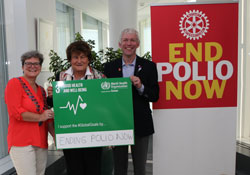24-10-2016 - Kilde: World Health Organization Europe
 Today, on World Polio Day, all WHO Member States and partners pause to celebrate the great progress made towards the global goal of eradicating poliomyelitis (polio). The WHO European Region has much to celebrate: its polio-free status was reconfirmed at the June 2016 meeting of the European Regional Certification Commission for Poliomyelitis Eradication (RCC).
Today, on World Polio Day, all WHO Member States and partners pause to celebrate the great progress made towards the global goal of eradicating poliomyelitis (polio). The WHO European Region has much to celebrate: its polio-free status was reconfirmed at the June 2016 meeting of the European Regional Certification Commission for Poliomyelitis Eradication (RCC).
Picture to the right: On World Polio Day, Regional Director Zsuzsanna Jakab, Helge W. Hess (Chairman Rotary Denmark) and Rina Sture Kristensen (District Governor Rotary District 1470) celebrate global collaboration and progress towards polio eradication.
Ukraine’s polio outbreak over but continuing efforts needed
The outbreak of circulating vaccine-derived poliovirus type 1 detected in Ukraine in September 2015 is now considered over. Based on a 12-month progress report submitted by Ukraine’s National Certification Commission for Poliomyelitis Eradication, a team of experts led by RCC Chair Professor David Salisbury declared on 14 October 2016 that “if the virus was circulating, the surveillance system would have detected it”.
WHO, the United Nations Children's Fund and other partners have been working closely with Ukrainian authorities since the first of a total of 2 cases was detected to improve disease surveillance systems, increase immunization coverage and raise public awareness about the disease. Among other activities, 3 rounds of immunization were conducted between October 2015 and February 2016, reaching millions of children aged 2 months to 10 years.
Despite this positive outcome, “the RCC remains extremely concerned that too many children in all parts of the country are still not fully vaccinated”, said Professor Salisbury. “The categorization of Ukraine as high risk by the RCC in June 2016 therefore remains justified.”
Professor Salisbury and RCC Member Dr Donato Greco are visiting Ukraine today to celebrate World Polio Day and to share the RCC conclusions and recommendations with the country’s political leadership. They will emphasize the importance of sustaining high-quality poliovirus surveillance and urge the Government to reduce the risk of virus circulation by closing the remaining immunity gaps. WHO and partners will continue to support the Ministry of Health in making vaccines available to all to protect against polio and other vaccine-preventable diseases.
World Polio Day – 24 October
World Polio Day was established by Rotary International over a decade ago to commemorate the birth of Jonas Salk, who led the development of the first successful vaccine against polio. Effective use of this inactivated poliovirus vaccine and subsequent widespread use of the oral poliovirus vaccine, developed by Albert Sabin, led to the 1998 World Health Assembly resolution to eradicate polio. Since that time, WHO, Rotary International and other partners in the Global Polio Eradication Initiative have been working to reduce polio worldwide. Fewer cases have been reported in 2016 to date than in any previous year. Eradicating polio is within reach and will be one of the greatest public health achievements in history, ensuring that every child – now and for generations to come – will be able to live a polio-free life.
